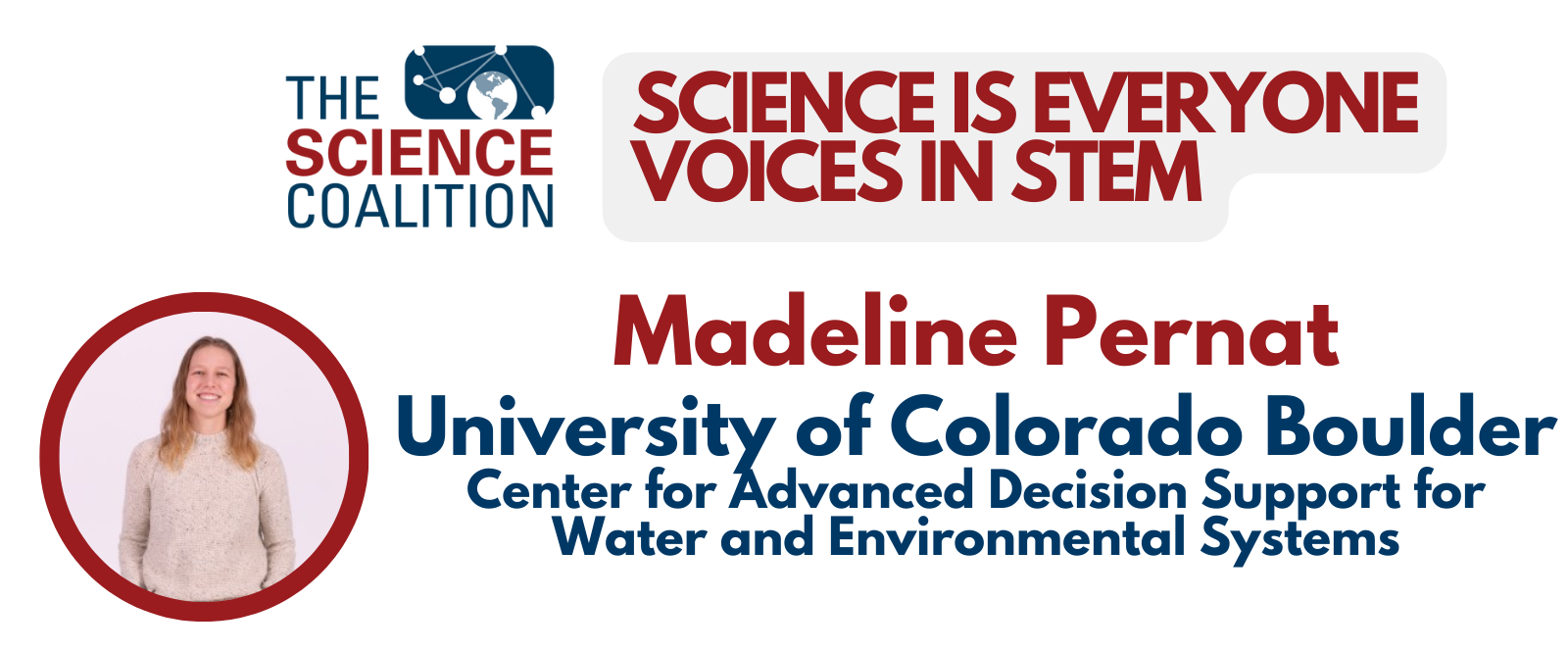
Madeline Pernat, a researcher at the University of Colorado Boulder, joined The Science Coalition to share her innovative research focused on adaptive water management strategies in the Colorado River Basin.

As we observe World Water Monitoring Day, it’s crucial to highlight the innovative research underway to address our most pressing water challenges. At the University of Colorado Boulder (CU Boulder), PhD student Madeline Pernat is developing strategies to guide water management in the Colorado River Basin – a vital water source for the American Southwest.
Madeline’s work focuses on creating an adaptive policymaking framework in the context of the ongoing negotiations for post-2026 Colorado River reservoir operations. Using advanced modeling and optimization techniques, she’s helping to shape the future of water management in a region facing severe drought and increasing demands on its water resources.
“The Colorado River is the lifeblood of the Southwest,” Madeline explains. “But with the ongoing drought, the basin’s main reservoirs are at low levels, and water delivery reductions are already taking place. On top of that, there’s uncertainty about the future –whether the drought will persist and how much water will be available in the coming years. This makes it an important time to develop adaptive policies that can respond to changing environmental conditions and water needs.”
Madeline’s research utilizes the Colorado River Simulation System (CRSS), a model of the river basin developed by the Bureau of Reclamation. CRSS simulates the basin’s reservoirs, river reaches, and water users, and it also models various future scenarios, such as continued drought or improved conditions. Importantly, CRSS models policy, allowing many different proposals to be tested and evaluated.
CRSS is implemented in RiverWare, a modeling software developed at the Center for Advanced Decision Support for Water and Environmental Systems (CADSWES) at CU Boulder that is used globally for modeling river and reservoir systems. In her work, Madeline couples CRSS with an advanced optimization algorithm to search for potential reservoir operating policies for Lake Powell and Lake Mead, which – simply put – define the relationship between reservoir levels and water releases.
She’s also developing data visualization techniques to help policymakers and stakeholders from diverse backgrounds easily evaluate and compare the performance of different potential policies, and how that performance shifts across various plausible future scenarios.
“Whether we’re looking at the Colorado River Basin or any other heavily managed river system, reservoir operating policies must be decided and implemented. The goal of the framework I’m developing is to help communicate under which future scenarios that policy is likely to perform well, highlight conditions that require close attention, and suggest better policy alternatives if those conditions become reality.”
Federal investments – including support from the Bureau of Reclamation and the National Science Foundation Graduate Research Fellowship – have played a key role in Madeline’s important work.
“Federal funding not only supports our research, but also fosters the development of technical skills and innovative thinking that will shape the future of water management,” she notes. “What’s particularly exciting about working on federally funded projects is how close to the real world the work is – it’s not just theory, but something that directly impacts people, policies, and the management of critical resources.”
The supportive community at CADSWES has also underpinned Madeline’s successful research efforts. Under the mentorship of Dr. Edith Zagona and Dr. Joseph Kasprzyk, Madeline has found a collaborative environment that encourages creativity and interdisciplinary approaches to knotty water issues.
As a member of the LGBTQ+ community, Madeline is also passionate about increasing representation in STEM fields. She serves as a mentor for incoming graduate students, with the goal of making the graduate community feel welcoming and inclusive from the moment someone steps into it.
“Water management is about more than just engineering – it’s about people and communities,” Madeline says. “I hope our research and visualization techniques will not only inform effective policies in the Colorado River Basin, but also apply to water management challenges around the world.”
On World Water Monitoring Day, Madeline’s work reminds us of the critical role that innovative research – backed by federal funding and strengthened by inclusive academic communities – plays in securing a more sustainable and equitable future.
Join the Conversation: Ask Madeline Anything!
We’re excited to announce an Ask Me Anything (AMA) opportunity with Madeline Pernat.
This is your chance to dive deeper into the world of water management, adaptive policymaking, and environmental modeling. Whether you’re curious about the technical aspects of her research or the future of water resources in the Southwest, Madeline is ready to answer your questions.
Submit your questions here!

